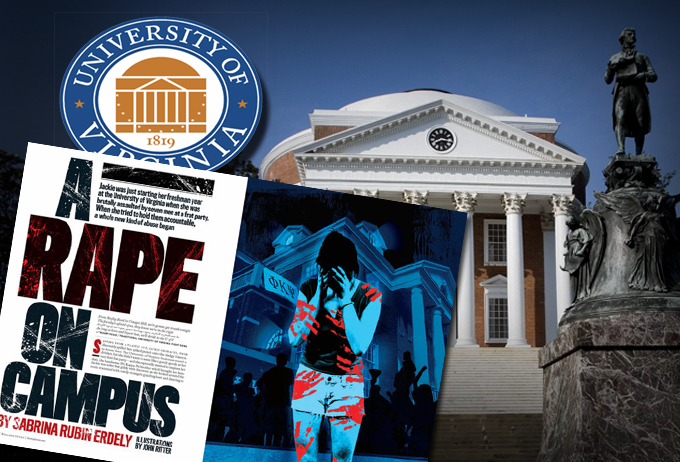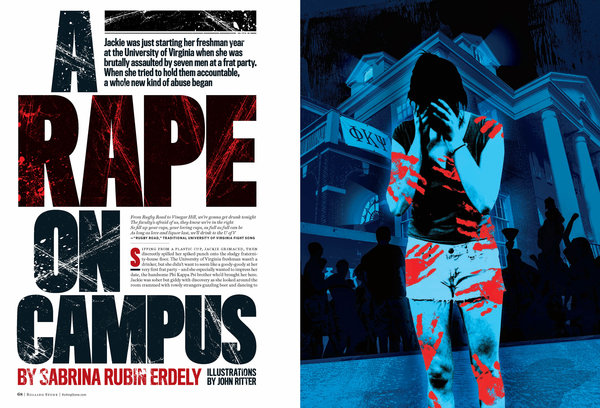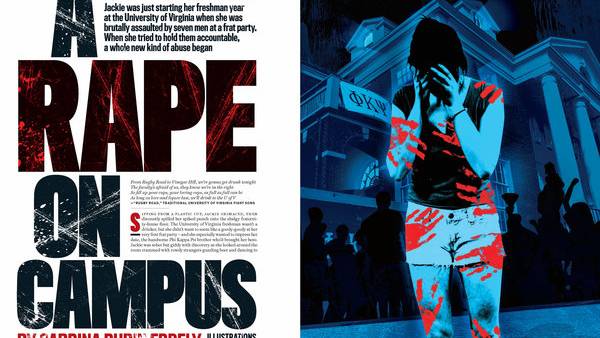Rolling Stone Article on Rape at University of Virginia Failed All Basics, Report Says
Source: nytimes.com

Rolling Stone magazine retracted its article about a brutal gang rape at a University of Virginia fraternity after the release of a report on Sunday that concluded the widely discredited piece was the result of failures at every stage of the process.
The report, published by the Columbia Graduate School of Journalism and commissioned by Rolling Stone, said the magazine failed to engage in “basic, even routine journalistic practice” to verify details of the ordeal that the magazine’s source, identified only as Jackie, described to the article’s author, Sabrina Rubin Erdely.
On Sunday, Ms. Erdely, in her first extensive comments since the article was cast into doubt, apologized to Rolling Stone’s readers, her colleagues and “any victims of sexual assault who may feel fearful as a result of my article.”
In an interview discussing Columbia’s findings, Jann S. Wenner, the publisher of Rolling Stone, acknowledged the piece’s flaws but said that it represented an isolated and unusual episode and that Ms. Erdely would continue to write for the magazine. The problems with the article started with its source, Mr. Wenner said. He described her as “a really expert fabulist storyteller” who managed to manipulate the magazine’s journalism process. When asked to clarify, he said that he was not trying to blame Jackie, “but obviously there is something here that is untruthful, and something sits at her doorstep.”
The Columbia report cataloged a series of errors at Rolling Stone, finding that the magazine could have avoided trouble with the article if certain basic “reporting pathways” had been followed. Written by Steve Coll, the Columbia journalism school’s dean; Sheila Coronel, the dean of academic affairs; and Derek Kravitz, a postgraduate research scholar at the university, the report, at nearly 13,000 words, is longer than the 9,000-word article, “A Rape on Campus.”
After its publication last November, the article stoked a national conversation about sexual assault on college campuses and roiled the university.
The police in Charlottesville, Va., said last month they had “exhausted all investigative leads” and found “no substantive basis” to support the article’s depiction of the assault. Jackie did not cooperate with the police and declined to be interviewed for the Columbia report. She also declined, through her lawyer, Palma Pustilnik, to be interviewed for this article. She is no longer in touch with some of the advocates who first brought her to the attention of Rolling Stone, said Emily Renda, a rape survivor working on sexual assault issues at the University of Virginia.
In a statement responding to the report, the University of Virginia’s president, Teresa A. Sullivan, described the article as irresponsible journalism that “unjustly damaged the reputations of many innocent individuals and the University of Virginia.”
Mr. Wenner said Will Dana, the magazine’s managing editor, and the editor of the article, Sean Woods, would keep their jobs.
Continue reading the main story
In an interview, Mr. Dana said he had reached many of the same conclusions as the Columbia report in his own efforts to examine the article, but he disagreed with the report’s assertion that the magazine had staked its reputation on the word of one source. “I think if you take a step back, our reputation rests on a lot more than this one story,” he said.
Ms. Erdely first heard Jackie’s account in a phone conversation last July, the report said. Jackie told her she had been lured to a darkened room at a fraternity party in September 2012, and raped by seven men, the article said, led by her date for the evening, a lifeguard at the university’s aquatic center identified only as Drew. Ms. Erdely hung up the phone “sickened and shaken,” the report said.
Despite some misgivings about the vividness of some of the details, which included a smashed glass coffee table and an assault with a beer bottle in the published account, Ms. Erdely interviewed Jackie seven more times between July and October of last year.
The first misstep during the reporting process, the Columbia report said, was that Ms. Erdely did not seek to independently contact three of Jackie’s friends, who were quoted in the piece, using pseudonyms, expressing trepidation at the idea of Jackie telling the authorities that she had been assaulted. The quotes came from Jackie’s recollection of the conversation. Those friends later cast doubt on Jackie’s story in interviews with The Washington Post and denied saying the words Rolling Stone had attributed to them. The three told the report’s authors that they would have made the same denials to Rolling Stone if they had been contacted.

The opening pages of the Rolling Stone article, which was published in November.
Rolling Stone, the report said, also did not provide the fraternity with enough information to adequately respond to questions from the magazine. Later, when the article had been published, the fraternity, Phi Kappa Psi, said it did not host a function on the weekend Jackie had specified.
And the magazine failed to identify Jackie’s attacker, the report said. It was content to give him a pseudonym, Drew, when Jackie resisted Ms. Erdely’s request to help find him. The fraternity, The Post and the police have been unable to find anyone who matches Jackie’s description of Drew.
The reporting errors by Ms. Erdely were compounded by insufficient scrutiny and skepticism from editors, the report said. And the fact-checking process relied heavily on four hours of conversations with Jackie.
So the biased yellow journalist with an axe to grind gets to keep her job. She didn't even apologize to the victims in her attack piece (the...
In an attempt to gain media attention (and hopefully subscribers), Rolling Stone shot itself in the foot. Yet, Wenner and Co. aren't too...
If there is one ray of sunshine in all of this Susan Rubin Erdeley's report proves what we all knew. The "rape crisis" in manufactured.
Ms. Erdely, a contributing editor at Rolling Stone who has also written for GQ and The New Yorker, declined to be interviewed for this article. She said in her apology that reading the report was “a brutal and humbling experience.” She also acknowledged that she did not do enough to verify Jackie’s account.
Rolling Stone’s fundamental mistake, Mr. Dana said, was in suspending any skepticism about Jackie’s account because of the sensitivity of the issue. “We didn’t think through all the implications of the decisions that we made while reporting the story, and we never sort of allowed for the fact that maybe the story we were being told was not true,” he said. That was compounded by the fact that any reporting on any purported crime that has not been reported to the authorities is difficult, he said.
“Ultimately, we were too deferential to our rape victim,” Mr. Woods, the article’s editor, said in the report. “We honored too many of her requests in our reporting. We should have been much tougher, and in not doing that, we maybe did her a disservice.”
Ms. Erdely, Mr. Wenner said, “was willing to go too far in her effort to try and protect a victim of apparently a horrible crime. She dropped her journalistic training, scruples and rules and convinced Sean to do the same. There is this series of falling dominoes.”
Mr. Dana said that the report was punishment enough for those involved, and that they did not deserve to lose their jobs because the article “was not the result of patterns in the work of these people.” The full report was posted on Rolling Stone’s website, and an edited version will appear in the print magazine. Mr. Dana has also written an editor’s note.
Both Mr. Dana and Mr. Wenner said that newsroom practices had been amended. “We are not going to cut those corners even for the most sympathetic reasons,” Mr. Wenner said. The article, and the ensuing scandal, may have discouraged some women from coming forward with their accounts of sexual assault, said John D. Foubert, a former dean at the University of Virginia and the current president of One in Four, a rape prevention charity. Ms. Renda, the expert at the university on sexual assault issues, said she hoped that one effect of the Columbia report would be that such a chilling effect would dissipate.
“In the long term I don’t think people are going to look back at this story and say,‘This is why women are not coming forward,’ ” Mr. Dana said. “At the same time, it’s certainly not helping things immediately.”
Ms. Renda, who was interviewed for the Columbia report, offered another reason that she felt the Rolling Stone article was flawed: The magazine was drawn toward the most extreme story of a campus rape it could find. The more nuanced accounts, she suggested, seemed somehow “not real enough to stand for rape culture. And that is part of the problem.”
Source: nytimes.com






















